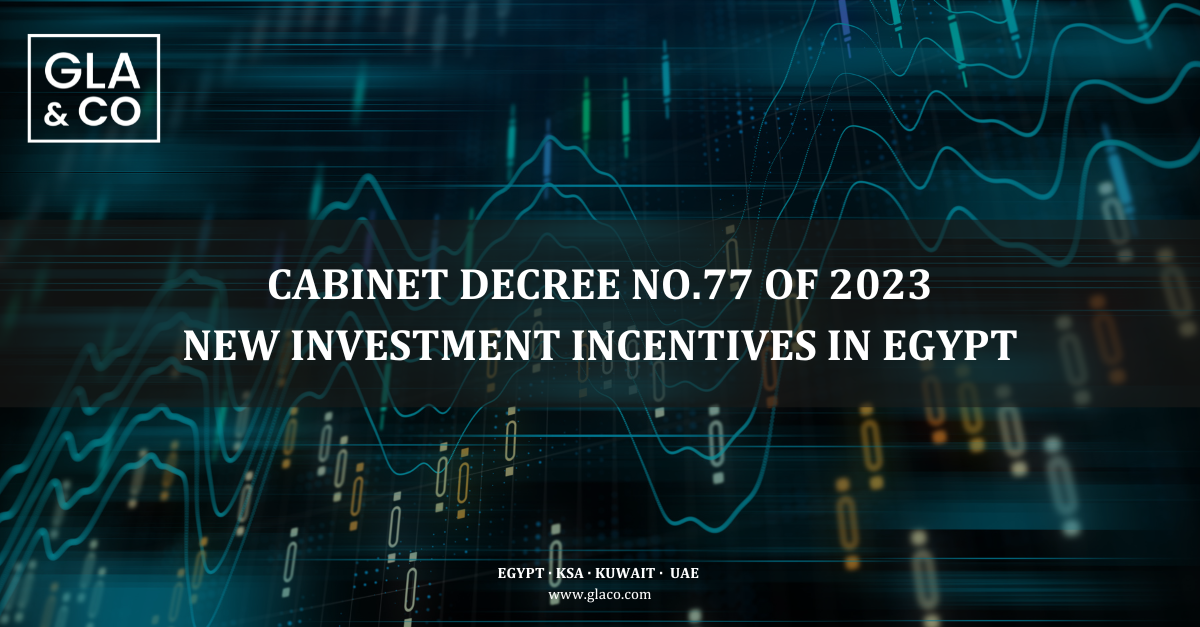
Cabinet Decree No.77 of 2023 – New Investment Incentives in Egypt
The Prime Minister signed on the Ministerial Decree No.77/2023 (the “Decree”) that was issued on 28 December 2023, in relation to investment incentives in Egypt. In alignment with the current necessity for economic growth and the need for investment flow in the country, the Decree sets the rules for granting investment incentives to investors.
This Decree is closely linked to the economic, financial and tax incentive provisions provided under the Egyptian Investment Law No. 72 of 2017 (the “Investment Law”).
The Decree tackles the targeted investment projects, highlights rules and conditions for receiving investment incentives, the different categories of the incentives, the restrictions on receiving investment incentives, and identifies the responsible committee for approving the incentives and the procedure that is followed.
In this article we address the various anticipated inquiries that may arise among our clients and typical investors concerning the recently introduced Decree.
What constitutes the targeted investment projects?
If you are an investor who typically conducts business in the industrial sector or mass production sectors, the incentives would be of extreme benefit to you. This is due to the fact that the Decree targets essentially industrial and production projects in the country, as well as their extensions and business that regularly produce any of the products attached in Annex 1 to the Decree.
What are the conditions to receive the incentives?
The project should head start within the time period stipulated under Article 11 Bis of the Investment Law and must be established in zones that are determined by the Council of Ministers or in distant zones, industrial, investment or technology zones (i.e. Economic zone of the Suez Canal, economic zone of the Golden Triangle and the zones in need of development including south Giza governorate, Port Said, Ismailia and Suez and Red Sea governorates).
The Decree further provides that the investment project should rely in its financing up until the date of commencement to undertake the activity on foreign currency transferred from abroad (“Foreign Funds”). The Foreign Funds, used to finance the investment project, should be an amount equivalent to a minimum of 50% of the funds. The transfer operations of the foreign currency cover the following scenarios:
- meaning foreign currency transferred from banks registered with the Egyptian Central Bank, used for the establishment of the project;
- foreign currency transferred for investing in the capital of the project;
- covers the transfer of equipment, materials or means of transportation necessary for the establishment and operation of the project and is calculated based on Egyptian accounting standards; and
- Profits subject to foreign transfers.
What are the categories and percentages of the incentives given?
It englobes incentives targeting directly taxes paid and cover the following percentages:
- For projects that rely on foreign currency transferred from abroad within the percentages of 50% or more and less than 75% of its money (as defined in the Investment Law), it is granted a 35% incentive on the taxes paid and stated in the income tax report;
- For projects that rely on foreign currency transferred from abroad within the percentages of 75% or more and less than 90% of its money, it is granted a 45% incentive on the taxes paid and stated in the income tax report;
- For projects that rely on foreign currency transferred from abroad with 90% or more, it is granted a 55% incentive on the taxes paid and stated in the income tax report.
Who is responsible of releasing a decision granting the incentives?
A committee headed by a representative of GAFI along with representatives from the Ministry of Finance, Ministry of Trade and Industry, the Central Bank, the Industrial Development Authority, the Industrial Modernisation Centre and the Egyptian Tax Authority (the “Committee”). After the Committee’s analysis of the incentive application submitted by the investor, it would submit its decision to the CEO of GAFI who is responsible for approving the decision within 45 days from the date of submission of the application. In the event where an application is rejected, the Committee must submit reasons behind such rejection to the applicant. Once the incentives certificate is granted to the investor, its term is presumed for seven (7) consecutive years.
How are the incentives released in practice?
The Ministry of Finance is responsible for releasing the incentives in favor of the investor within 45 days from the expiry date of the income tax application submitted before the Egyptian Tax Authority.
Conclusion
With the implementation of this Decree, we anticipate an increase in investment ventures and a boost in the confidence of both local and international investors to invest in the country and make great use of the incentives provided. As the Decree allows investors to communicate with the competent ministries, submit their preliminary vision of the project and receive preliminary approval on the project’s eligibility for receiving incentives that will be granted which showcases flexibility.
In line with the Decree’s objective of flexibility, we have observed the legislator’s emphasis on incorporating a provision that allows for regular and specific revisions as deemed necessary. These revisions will be undertaken by a committee established through a decision by the prime minister.
Authors: Partner, Hegui Taha and Associate, Rana Mostafa
For further information, please contact Managing Partner Alex Saleh (alex.saleh@glaco.com) or Hegui Taha (hegui.taha@glaco.com)

